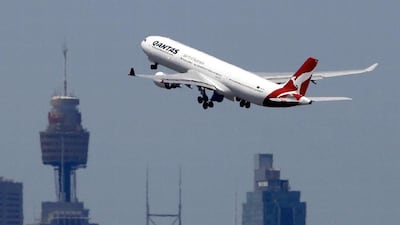Qantas Airways’ revenue in the three months ended September 30 declined 3.2 per cent to A$3.98 billion from a year earlier, even as passenger numbers grew 2.5 per cent, it said today.
The Australian carrier said first-half earnings may fall as much as 13 per cent as competition drives down international air fares. Underlying profit before tax will be between A$800 million (Dh2.23m) and A$850m for the six months ending December 31. The figure was A$921m in the same period a year ago.
A smaller fuel bill and a cost-cutting programme will not be enough to compensate for declining revenue, Qantas said. Worldwide, the falling price of jet fuel – typically an airline’s biggest expense – is encouraging carriers to lay on more flights. That is driving down ticket prices.
Qantas faces “a more challenging international revenue environment,” said the chief executive Alan Joyce. “Like most carriers globally, we are seeing international air fares below where they were 12 months ago.”
Shares in Qantas rose 1 per cent to A$2.97 at 11:15am in Sydney, trimming this year’s decline to 27 per cent. Within the first hour of trading, the stock dropped as much 9.2 per cent and traded up as much as 5.4 per cent.
Qantas reined in planned capacity growth by as much as 50 per cent. Across the group, capacity in the first half will increase between 1.5 and 2 per cent, down from earlier expectations of 2 to 3 per cent growth, it said.
The airline in August announced its first dividend since 2009 and handed bonuses to 25,000 workers as Mr Joyce’s A$2bn turnaround programme delivered a record annual profit. Mr Joyce has cut thousands of jobs, deferred aircraft and dropped unprofitable routes.
The airline had previously said that domestic traffic in July and August was hurt by softening demand stemming from Australia’s federal election in July. Qantas said today the local market stabilised in September, other than those routes affected by the end of the nation’s commodities boom.
Qantas’ first-half fuel bill will be about A$1.5bn, it said. For the full year, the cost will be A$3.15bn and no more than A$3.2bn. Qantas’ fuel expenses were A$3.25bn for the whole of last year.
Monday’s statement is the first quarterly update to replace the airline’s monthly release of traffic statistics.
* Bloomberg
business@thenational.ae
Follow The National's Business section on Twitter

